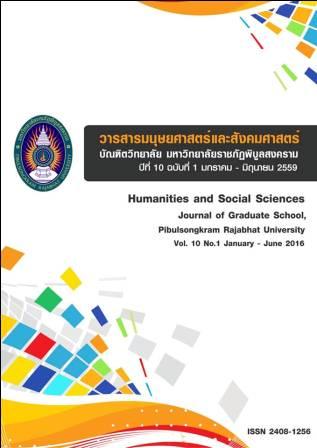กลยุทธ์การบริหารแบบมีส่วนร่วมของไตรภาคีในการยกระดับคุณภาพผู้เรียนในโรงเรียนพื้นที่สูงภาคเหนือตอนบน
Keywords:
กลยุทธ์การบริหารแบบมีส่วนร่วม, ไตรภาคี, คุณภาพผู้เรียน, โรงเรียนพื้นที่สูง, Participative management strategies, Tri Participative, Learners Quality, Schools in northern highland areasAbstract
การวิจัยนี้มีวัตถุประสงค์เพื่อ 1) ศึกษาสภาพปัจจุบันในการบริหารแบบมีส่วนร่วมของไตรภาคีในการยกระดับคุณภาพผู้เรียนในโรงเรียนพื้นที่สูงภาคเหนือตอนบน 2) นำเสนอกลยุทธ์การบริหารแบบมีส่วนร่วมของไตรภาคีในการยกระดับคุณภาพผู้เรียนในโรงเรียนบนพื้นที่สูงภาคเหนือตอนบน การดำเนินการวิจัย มี 3 ขั้นตอน คือ ขั้นตอนที่ 1 เป็นการศึกษาหลักการ แนวคิด ทฤษฎี วิธีการ และกลยุทธ์การบริหารจากเอกสาร และจากผู้ทรงคุณวุฒิ ขั้นตอนที่ 2 เป็นการยกร่างกลยุทธ์การบริหารแบบมีส่วนร่วมของไตรภาคีในการยกระดับคุณภาพผู้เรียนในโรงเรียนบนพื้นที่สูงภาคเหนือตอนบน โดยการสนทนากลุ่มผู้ทรงคุณวุฒิ ขั้นตอนที่ 3 เป็นการตรวจสอบความเหมาะสมและความเป็นไปได้ของกลยุทธ์โดยสัมมนาอ้างอิงผู้เชี่ยวชาญ (connoisseurship techniques) จากผู้ทรงคุณวุฒิบนพื้นที่สูงในพื้นที่จังหวัดเชียงใหม่และแม่ฮ่องสอน ผลการวิจัยพบว่า กลยุทธ์การบริหารแบบมีส่วนร่วมของไตรภาคีในการยกระดับคุณภาพผู้เรียนในโรงเรียนบนพื้นที่สูงภาคเหนือตอนบน ประกอบด้วย 5 กลยุทธ์หลัก ดังนี้ 1) สร้างเครือข่ายร่วมใจระบบไตรภาคี 2) ยกระดับการมีส่วนร่วมของไตรภาคีในการพัฒนาคุณภาพผู้เรียน 3) พัฒนาภาวะผู้นำของไตรภาคีเพื่อการบริหารแบบมีส่วนร่วม 4) ระดมทรัพยากรเพื่อการศึกษาโดยการมีส่วนร่วมของไตรภาคี และ 5) พัฒนาระบบเทคโนโลยีสารสนเทศ สำหรับโรงเรียนพื้นที่สูง และผลการตรวจสอบกลยุทธ์การบริหารแบบมีส่วนร่วมของไตรภาคีในการยกระดับคุณภาพผู้เรียนในโรงเรียนบนพื้นที่สูงภาคเหนือตอนบน มีความเหมาะสมและมีความเป็นไปได้ในทางปฏิบัติอยู่ในระดับมากที่สุด
This purposes of research were to study the condition of tripartite participative management strategies for upgrading learners’ quality of schools in northern highland areas, and suggested strategies. The study were conducted through three steps. First the theories and concepts of administrative strategic management were studied. Second, the tripartite participative management strategies had been created by using focus group discussion. Third, the tripartite participative management strategies were evaluated by connoisseurship techniques by the experts of Chiang-Mai and Maehongson. The results of the study revealed that there were 5 main strategies: networking efforts using a tripartite system, raising the involvement of tripartite to develop learners, developing leadership for the management of the trilateral cooperative, mobilizing resources for education by tripartite participation, and developing information technology for the schools. In addition, the assessment of the strategies indicated that the tripartite management strategies were very useful.
Downloads
How to Cite
Issue
Section
License
Any articles or comments appearing in the Journal of Humanities and Social Sciences, Rajabhat Phibulsongkram University, are the intellectual property of the authors, and do not necessarily reflect the views of the editorial board. Published articles are copyrighted by the Journal of Humanities and Social Sciences, Rajabhat Phibulsongkram University.









